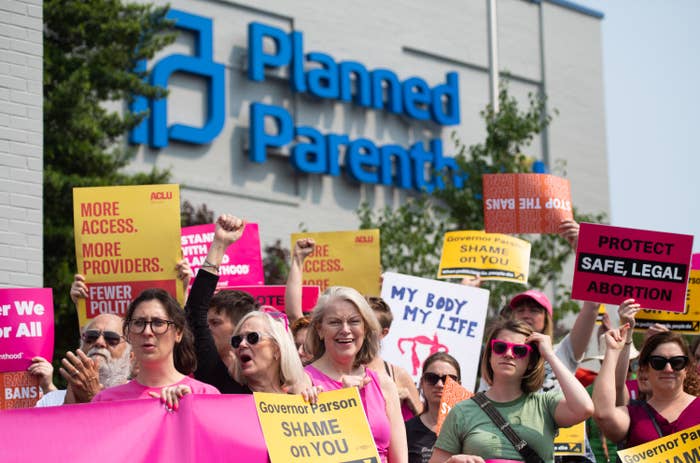
WASHINGTON — A federal judge in Missouri on Tuesday blocked the state from enforcing a ban on abortions after 8 weeks of pregnancy, the latest in a series of court decisions knocking down early-term abortion bans in other states.
US District Judge Howard Sachs wrote that Missouri’s effort to ban abortions for nonviable pregnancies was clearly contrary to US Supreme Court precedent. The ban was set to take effect Wednesday.
“While federal courts should generally be very cautious before delaying the effect of State laws, the sense of caution may be mitigated when the legislation seems designed, as here, as a protest against Supreme Court decisions,” Sachs wrote.
The judge did rule that Missouri could proceed with a ban on abortions based solely on gender, race, or Down syndrome diagnosis, but noted that he expected that law would eventually be struck down as unlawful, too. Still, he denied a request by Planned Parenthood in St. Louis for a preliminary injunction because it hadn’t presented enough evidence that women would be affected by that law as the case went forward.
Sachs said he would be open to an “adequately supported” effort by Planned Parenthood to renew its request for an injunction for the reasons-based abortion ban, however.
Alexis McGill Johnson, acting president and CEO of Planned Parenthood Federation of America, said in a statement that they would continue to press their challenge to the reasons-based abortion ban.
"Let’s be very clear: these severe restrictions on abortion access do nothing to address disability rights or discrimination. They only stigmatize abortion and shame the people who seek that care. Planned Parenthood won’t cower to politicians. We will continue fighting in court and working with every person to ensure they get the health care they need and deserve," Johnson said.
The American Civil Liberties Union is representing Planned Parenthood in the case. Jennifer Dalven, director of the American Civil Liberties Union’s Reproductive Freedom Project, said in a statement that Tuesday's decision was "a crucial victory for Missourians and for all people in this country fighting for their reproductive freedom as it continues to come under attack like never before."
Missouri Gov. Michael Parson said in a statement that they were "encouraged" the court allowed the reasons-based ban to go forward, and "we look forward to litigating the remaining issues."
The Planned Parenthood clinic in St. Louis is the only abortion provider in Missouri. Earlier this year, the state refused to renew its license, threatening the clinic’s ability to operate, but a judge, and later a state administrative commission, allowed the clinic to stay open while it challenges the licensing decision. The state’s Administrative Hearing Commission is set to take up the matter in October, according to the Kansas City Star.
Missouri’s law doesn’t go as far as some states’, but a ban on abortion after 8 weeks makes it among the most restrictive laws in the country. Judges in Ohio, Mississippi, Kentucky, North Dakota, and Iowa have so far blocked laws that ban abortions after a fetal heartbeat is detected, usually around 6 weeks. Litigation is pending against other state abortion laws that ban the procedure early in pregnancy, as well as an Alabama law set to take effect in November that would ban abortions altogether except in cases where the woman’s health is at serious risk.
Officials in these states and other supporters of early-term bans have openly acknowledged that they’re likely to lose in the lower courts, given Supreme Court decisions such as Roe v. Wade, which established a constitutional right to abortion, and Planned Parenthood of Southeastern Pennsylvania v. Casey, which held that states couldn’t ban abortions before a fetus was viable and couldn’t impose significant burdens on women’s ability to access the procedure.
Instead, the express goal of supporters is to force the issue of abortion rights back before the Supreme Court, in the hopes that the court — now with a solid majority of conservative-leaning justices — will overturn Roe, or at least scale it back.
Challenges to state laws based on the reasons a woman chooses to have an abortion, as opposed to the length of her pregnancy, are slowly trickling up through the courts. Federal judges in Indiana and Arkansas issued injunctions blocking such bans, and in April 2018, the US Court of Appeals for the 7th Circuit agreed that Indiana’s law couldn’t take effect.
In May, the Supreme Court denied a request to hear the Indiana case, which meant the state couldn’t enforce its reasons-based ban. The justices wrote that it was simply too soon to take up the issue, and that they would wait for other courts to weigh in.
In a separate 20-page opinion, however, Justice Clarence Thomas wrote that he would support such a reasons-based ban whenever it did come back before the court. He wrote that he believed there were signs that abortion was being used to “achieve eugenic goals.”
UPDATE
Updated with comment from Planned Parenthood.
UPDATE
Updated with comment from Gov. Michael Parson.

